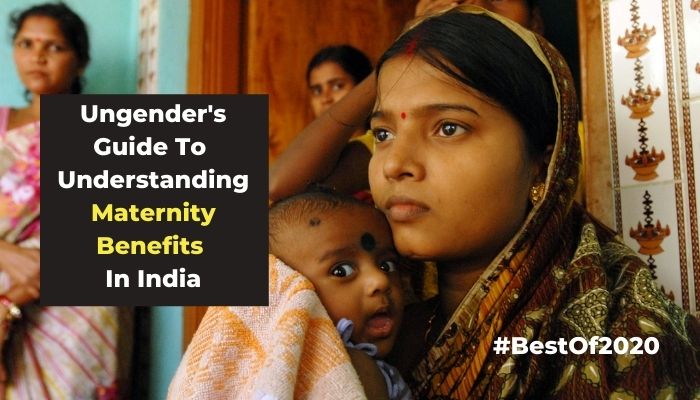Ungender’s Guide To Understanding Maternity Benefits In India

Written by: Rajkanya Mahapatra
Editor’s Note: As we approach the end of 2020 and take stock of the unprecedented nature of the last 10 months, we’re revisiting some of the conversations we’ve had on understanding, applying and complying with POSH, on maternity benefits, trans rights, on rights of persons with disabilities and how we should be envisioning a workplace that is fair, safe and inclusive.
In line with that thought, here are 5 essential reads on Maternity Rights and Benefits that Ungender published in 2020. Read it as a refresher, save it as your go-to list of resources on maternity benefits in India or write to the Ungender Insights editor at rajkanya@ungender.in on what more on maternity benefits in India would you like to read.
1) Five Legal Aspects To Know If You Are A Working Mother
Working mothers and mothers-to-be have certain legal rights and protections as per the law. In this article, Suruchi Kumar, Head of Legal Services at Ungender, shares important details on maternity leave, crèche facilities at work, adoption, surrogacy and abortion – all from the point of view of maternity benefits. Bookmark this brief resource sheet for yourself or someone you know who could use this!
Read the article, here.


2) Explained: What India’s New Labour Codes Mean For Women
The new Labour Codes are expected to come into effect soon and it’s important to know what these codes say for how maternity benefits will work for biological and adopting mothers, what happens if a woman encounters medical difficulties during their pregnancy, protections from wrongful dismissals, and more. Supreme Court Advocate Megha Chandra has kept this explainer both concise and comprehensive.
Read the article, here.
3) Five Changes Made To Maternity Benefits Under The New Labour Code
Continuing the conversation on Labour Codes and maternity benefits, read this article by Ungender writer, Karan Arora, on the five specific changes that were made to the provisions of the Maternity Benefit Act (MBA) under the new Labour Codes.
Under the Code of Social Security 2020, any woman worker who wants to avail maternity benefits will have to establish her identity using an Aadhar card. The new code has also enhanced punishments/penalties for employers in case they fail to provide their employees with maternity benefits. The article unpacks five such changes.
Read the article, here.
4) Maternity Benefits and Creche Facilities For Contractual Labour
The Periodic Labour Force Survey (2017 – 18) sheds lights on the employment trends for women across sectors. The data tell us that the manufacturing sector is the single largest employer for women in the urban areas followed by textile and garment workers, food processing, tobacco products (beedi workers) and leather goods. Teachers constituted another big chunk as are domestic workers (care workers) followed by salespersons, housekeeping and restaurant services workers, clerks and in other occupations. All these occupations function on contracts.
Are these women workers entitled to maternity benefits? Yes, they are! This explainer will take you through the many intricacies of how these benefits are applied and disbursed, if at all, within the informal sector.
Read the article, here.



5) Maternity Benefit Cases That Were Heard In Indian Courts Between June and August 2020
This quarterly roundup by Supreme Court Advocate Megha Chandra lists two judgments which sheds light on the important question of ‘how can contractual employees avail maternity benefits?’
In the first, the woman was denied maternity leave by her employer because she was on a contract and in the second case, the employer couldn’t provide the woman with the Child Care Leave (CCL) she had requested for as she was not a permanent employee. Read the article to understand both cases and judgments and build a better perspective on how maternity leave and benefits work in the country.
Read the article, here.
Featured Image Credit: DFID – UK Department For International Development/Flickr
Ungender Insights is the product of our learning from advisory work at Ungender. Our team specializes in advising workplaces on workplace diversity and inclusion. Write to us at contact@ungender.in to understand how we can partner with your organization to build a more inclusive workplace.
Read our insights about diversity, legal updates and industry knowledge on workplace inclusion at Ungender Insights. Visit our Blog.
Sign up to stay up-to-date with our free e-mail newsletter.
The above insights are a product of our learning from our advisory work at Ungender. Our Team specialises in advising workplaces on gender centric laws.
or email us at contact@ungender.in




